Tiyeni's July newsletter
12 July 2023
National Field Day: a celebration of Deep Bed Farming
Tiyeni’s National Field Day is one of the highlights in the Deep Bed Farming calendar. It’s an opportunity for farmers old and new to Deep Bed Farming to come together, celebrate success and share information. And this year’s event, which took place in Chiwamba, generated a strong interest in adopting Deep Bed Farming from both government and farmers across the country. Godfrey Kumwenda, Tiyeni’s Training Manager, tells us more.
The selection of the venue for the National Field Day is an important decision.
The selection is made by weighing up the level of demand from farmers for the technology at the village level, the number of farmers who have adopted Deep Bed Farming and its success, farmer-to-farmer extension and the level of commitment from government extension staff and policy makers. These determinations having been made with government extension staff, planning of the event can begin.
The theme agreed for this year was “Promotion of Deep Bed Farming for Improved Land Productivity, Catchment Protection and Resilience Against Climate Change”. Once the venue is chosen and the Day’s theme has been agreed, the planning starts at village level where all the farmers who have adopted Deep Bed Farming are involved in deciding how the fields would be hosted, alongside Tiyeni and government extension staff. The field day is attended by both new and old farmers – those who have adopted Deep Bed Farming and those who are interested to adopt.
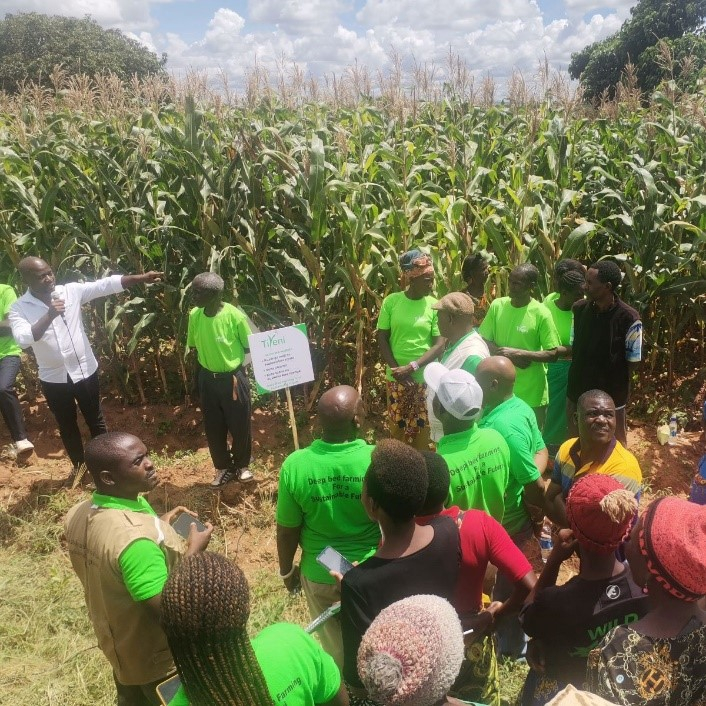
Farmers are the prime beneficiary of the event. To this end, four or five sites are selected where various Deep Bed Farming activities are displayed by farmers themselves. With the idea of promoting farmer-to-farmer extension training, the farmers themselves explain to the participants what they have done and what benefits they are getting from Deep Bed Farming.
Although the needs of the farmers are paramount, the National Field Day is also an important opportunity for some of our key stakeholders in Malawi to see and hear firsthand how Deep Bed Farming is benefitting both the farmers and their livelihoods and the health of the soil. Staff from the Ministry of Agriculture are key attendees: directors, programme managers and chief agricultural officers from all the neighbouring Agricultural Development Divisions, the District Agricultural Extension Services, Crops Department and others. Other key invitees are researchers and local partner organisations.
The event has a huge impact when it comes to promotion of new technologies to the farmers and researchers. During the National Field Day this year, the event managed to reach 2,115 farmers (815 old farmers and 1,300 new farmers). As a result of this, we expect that more than 1,500 farmers will adopt Deep Bed Farming in the 2023/24 growing season in this central area of Malawi. As well as that, the field day brought together directors and chief agricultural officers from Salima, Blantyre and Karonga Agricultural Development Divisions and Rumphi, Chitipa and Mzimba North and South District Agriculture Offices, researchers from the Department of Agricultural Research Services, Pyxus Agriculture Malawi and other organisations. A total of two hundred government extension staff attended the field days in all the areas.
The National Field Day generated a request from the Ministry of Agriculture for Tiyeni to move swiftly to train government extension staff across the country so that every farmer should have the opportunity to benefit from Deep Bed Farming activities because Deep Bed Farming has the best catchment management approach with its climate smart technology. In order to ensure the sustainability and widespread adoption of Deep Bed Farming, we need to consider how we can start training government extension staff in all eight Agricultural Development Divisions in Malawi. Our aim is to seek funding from donors and other organisations as soon as possible. It is an exceptional opportunity to spread the word and train farmers in Deep Bed Farming, as these government field officers are the ones who spend every day working with their designated farming settlements.
“I saw my first Deep Bed Farm in 2011 and that was it! I was hooked!!” Meet Colin Andrews, Tiyeni’s Chair
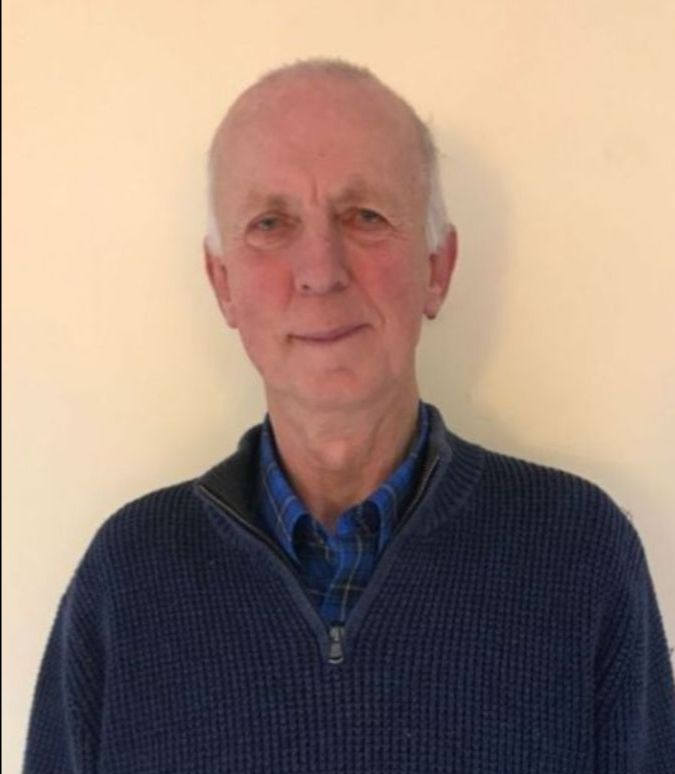
As a chartered surveyor, Colin worked on farms across Australia and then in Melbourne before returning to the UK. Colin became a trustee of Tiyeni in 2013 and Chair in 2018. He is a regular visitor to the Tiyeni base in Mzuzu to see the Tiyeni methods in operation and promote the soil-care system. We caught up with him to find out more.
You've been working with Tiyeni, first as a trustee and now as Chair, for a few years now. How did you first get involved? What attracted you to Tiyeni?
As a surveyor, I have a long-held interest in geomorphology, starting my career in Iceland measuring tectonic drift. My introduction to Deep Bed Farming was accidental. I met Tiyeni’s founder by chance when visiting family in Malawi in 2011. I asked to see a Deep Bed Farm and was so impressed that I asked why this was not spreading all over Malawi. Tiyeni’s founder looked at me curiously and said “How?” and that was it! I was hooked!!
What does being Chair of Tiyeni entail?
I see my role as a guiding light, a ‘tap on the tiller’, with a very open mind. With my increasing knowledge in soil, farming and water conservation, I see a role for me in advocacy.
You must have seen big changes both in Tiyeni and in the external landscape in the time you've been involved?
Tiyeni has changed from a small prototype in 2011 with 38 adopters to the current numbers of well over 30,000 farmers. The biggest change which our Malawi team made in 2016 was to stop the training in centralised demonstration gardens which were causing social difficulties in communities, and move to decentralised training based on ensuring equal parts of the training were carried out in each of the farmers’ fields. The success of this led us to realise that there are three essential components to Deep Bed Farming. The physical (making the contour ridges, breaking the hardpan and forming the beds), the biological (soil care, mulching, compost, cover crops, rotation etc) and the sociological (listening to the farmers’ needs, discussing and sharing knowledge rather than dictating, letting farmers take ownership). We all saw clearly that without the sociological, any initiative is unlikely to be sustainable.
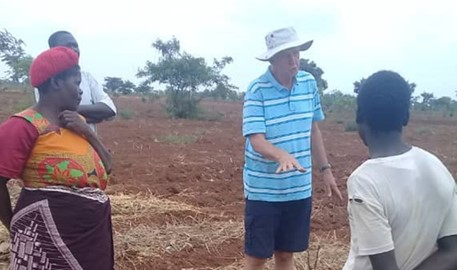
What is your vision for the future of Deep Bed Farming?
With its proven prodigious crop increases and its undoubted water conservation attributes, I would like to see these elements of Deep Bed Farming adopted throughout Malawi (many other parts of Deep Bed Farming are common to many organisations). The result of THAT would be a massive increase in the robustness of the national economy. Just imagine! All the rain percolated into the soil or held in swales and sand dams, erosion virtually halted, severity of floods substantially reduced, crop yields two to three times greater, ever improving soil health, and water tables replenished meaning potentially access to clean water for all. I really do not think that is an impossible vision.
What is unique about Tiyeni's Deep Bed Farming approach?
- Farmers own it and love it. They and their families become food secure.
- Each farmer, by preventing water running downhill and allowing it to percolate, helps every other farmer in the catchment directly or indirectly
- This method robustly defends farmers from the effects of climate change.
Tiyeni has just published a new version of the Field Training Manual. Who is the manual for? How should they use it? How will it support Tiyeni's work?
The manual needed updating for very good reasons. It was written in 2015/16 and since then our training staff have learned SO much more from the farmers, that it was essential we reflected this. The manual is for all trainers be they in Tiyeni, Government Agricultural Officials, staff in other NGOs and any landholder who wishes to adopt Deep Bed Farming from the manual published on our website.
Already there is a group of farmers who are carrying out top quality Deep Bed Farming having trained themselves from our manual on-line.
What do you like to do when you take your Tiyeni hat off?
I run a hedge-laying club in my home area and am part of a small group called Trees for the Future where we plant trees mainly to bring back hedgerows that were grubbed out in the 1960s. We have arranged for more than 60,000 trees to be planted in the last three years.
I am also a keen cyclist and ski tourer and try to do at least one week of each of these every year.
Coming soon to a field near you
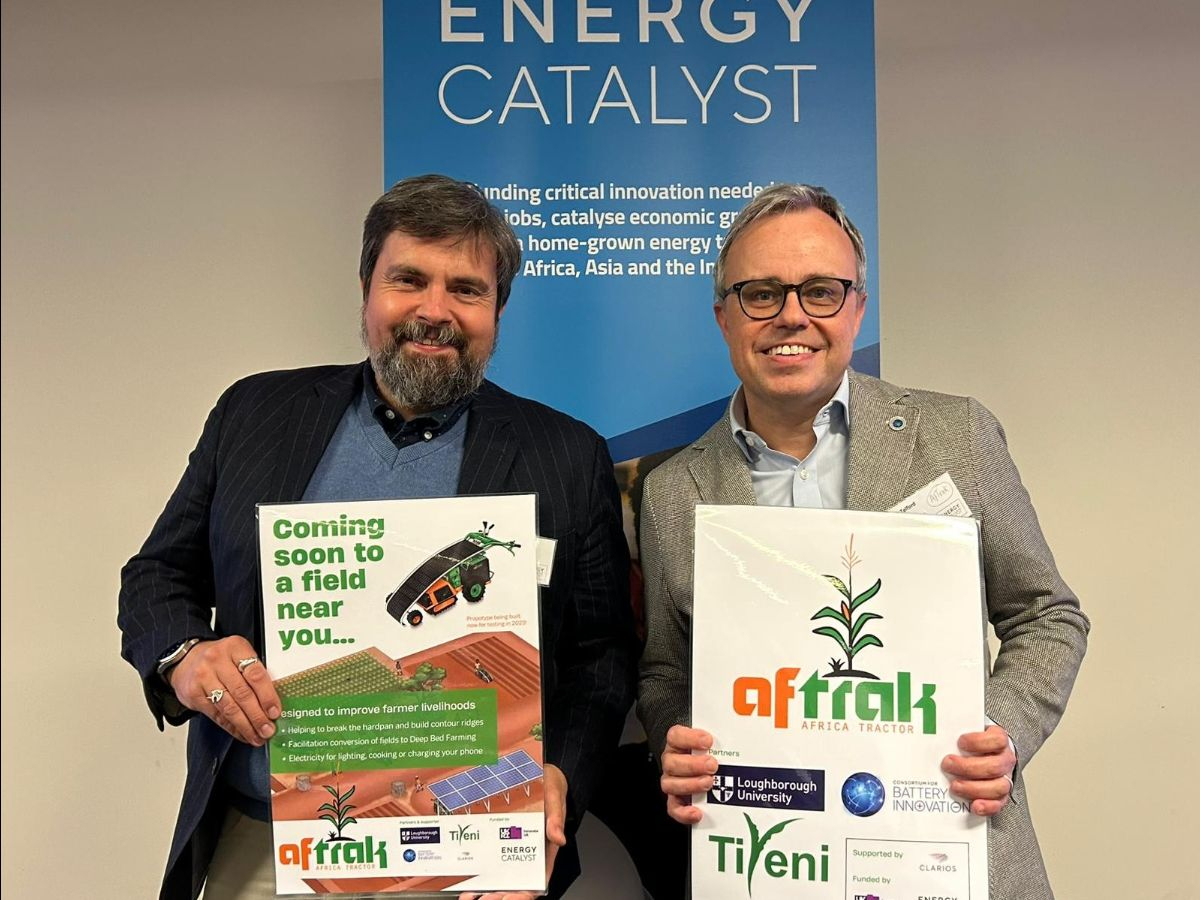
Working with our partners, Loughborough University and the Consortium for Battery Innovation (CBI), we are delighted to have been awarded a grant from Innovate UK to develop a prototype and a sustainable business plan for a potentially revolutionary tractor design for Africa, AfTrak. The tractor, which is being developed at Loughborough University, will be a low-cost, hand-operated solution for farming in the difficult conditions often encountered in Malawi.
Carl Telford, CBI, said “The idea for the project came from Dr Jonathan Wilson from Loughborough University – we were both on a trip to Malawi with Innovate UK, and he came up with the idea for a small battery tractor over dinner one evening. It just grew from there, and once the Tiyeni team got involved it became serious.”
Across large areas of Malawi, under the few inches of topsoil, there is a heavily compacted layer of rock-hard earth through which plants cannot penetrate known as hardpan. The proposed AfTrak system is a low-cost, walk-behind, micro electric tractor powered entirely by solar which is capable of mechanising land preparation in line with Deep Bed Farming to prepare soil to a depth of 400mm.
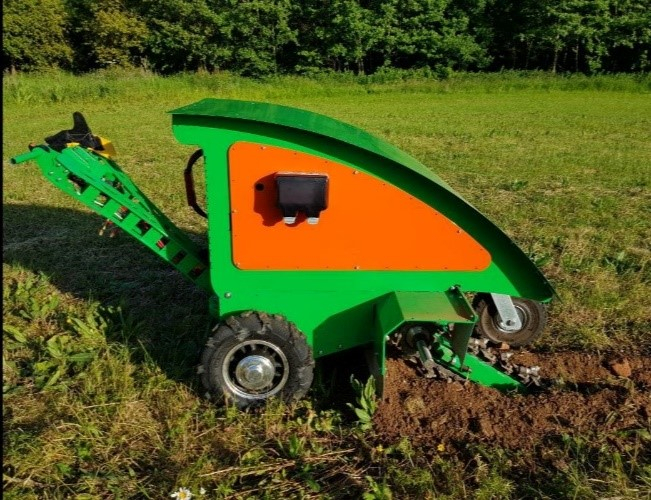
The AfTrak tractor will be trialled in Malawi with a focus on enabling Deep Bed Farming. Deep Bed Farming requires a substantial increase in the amount of land preparation in the first year before an increase in yield is produced. This can create a barrier to entry, especially for those households with reduced capacity to conduct manual labour such as elderly, disabled, child or female-led households.
Coupling the capabilities of AfTrak to the significantly lower labour demands of the initial land preparation, we will be able to educate and engage communities at a faster rate allowing communities to generate additional income. According to Country Director, Isaac Chavula, “This is a breakthrough. Finally, I can see a solution through the AfTrak tractors to break the hardpan soil that has long challenged farmers. By adopting the Deep Bed Farming technique, farmers can now envision relief with the AfTrak tractors.”
AfTrak will be demonstrated and trialled in Malawi over this land preparation season to collect stakeholder feedback to refine AfTrak requirements and specifications prior to manufacture and to ensure local input is at the forefront of the project.
Over 800 million people have no reliable access to electricity, primarily in sub-Saharan Africa and rural regions of Asia. AfTrak also provides power for agricultural applications such as water irrigation and domestic applications such as phone charging, electric cooking and lighting.
Breaking news: The prototype AfTrak tractor was shipped to Malawi last week and is due to arrive in a few weeks. We can't wait to begin trialling it with some farmers and to get their feedback.
Our work is only possible thanks to you, our dedicated supporters. Please consider donating to rapidly lift a farmer, or a family, in Malawi out of poverty and set them up for life. A donation of £55 will train a farmer for life.